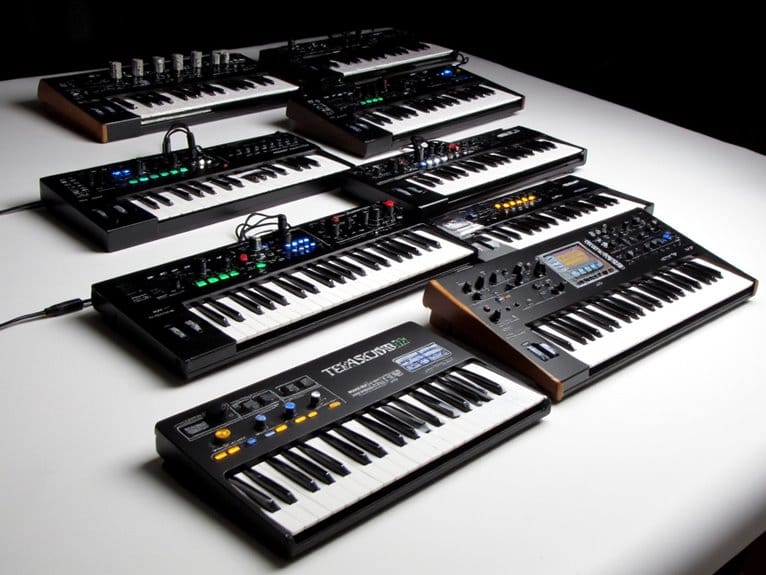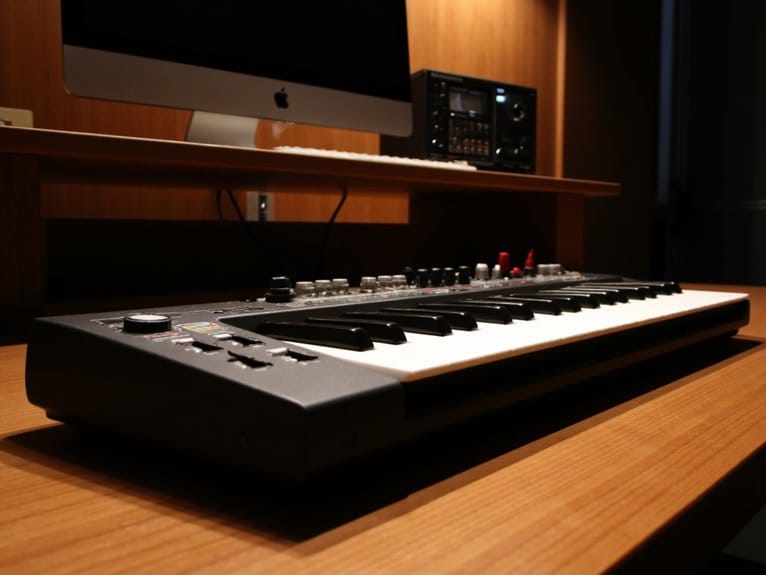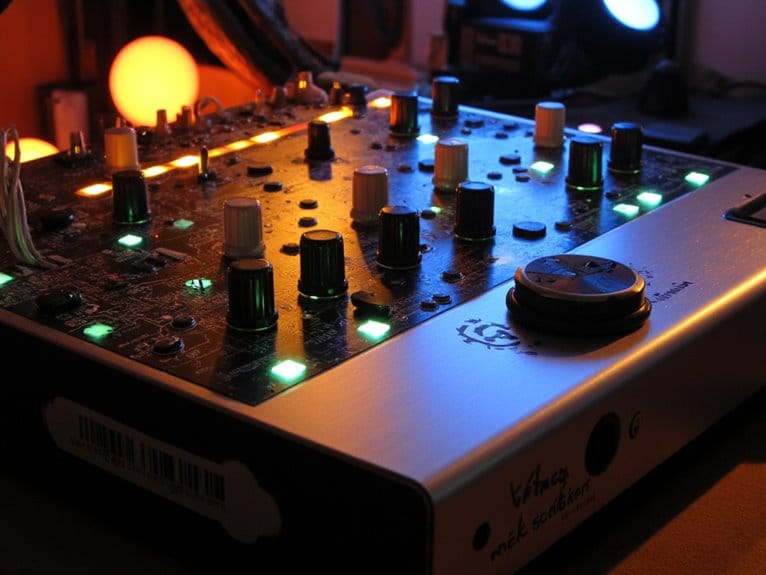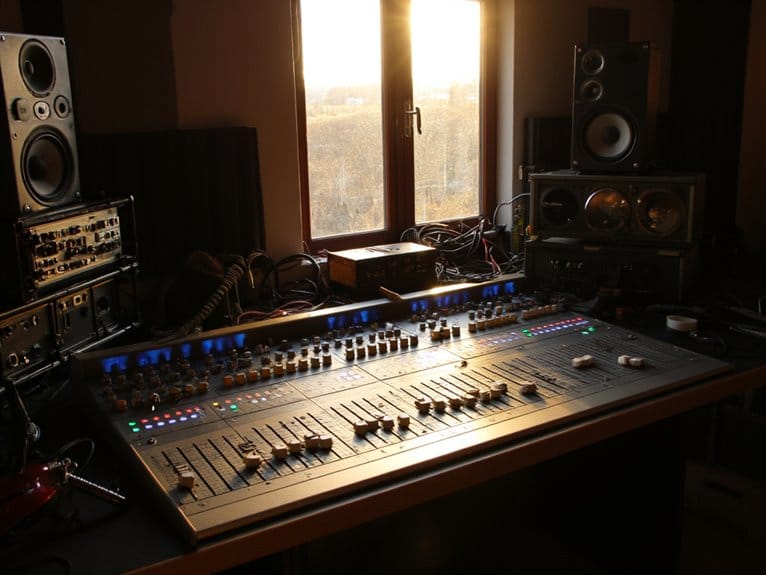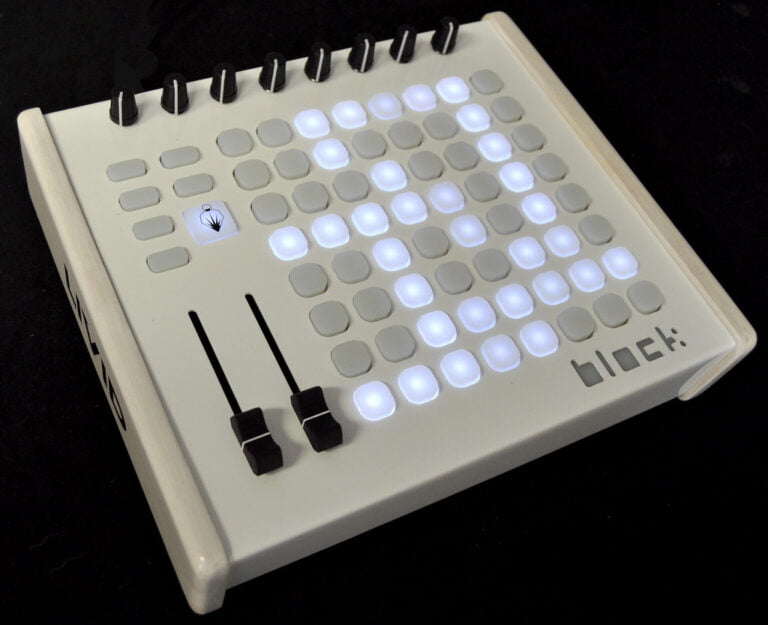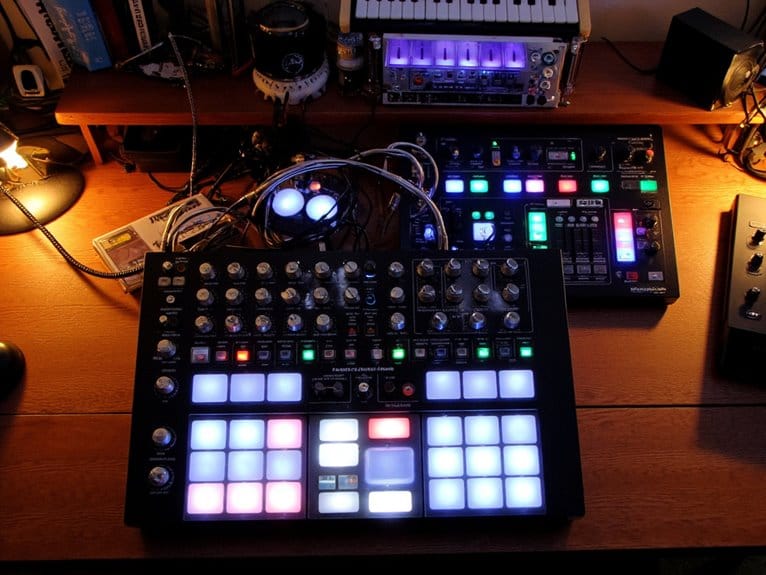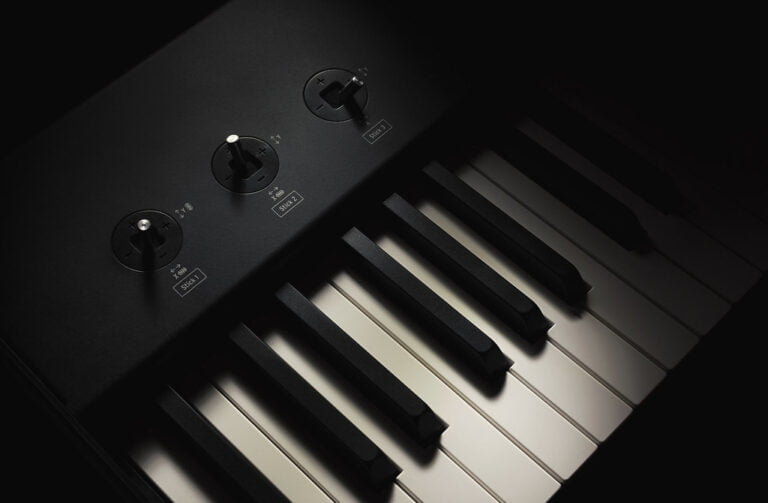10 Best 61-Key MIDI Controllers for Home Studios and Live Performance
I’ve tested dozens of 61-key MIDI controllers, and the Roland JUNO-D6‘s 3,800 onboard sounds excel for live performance. The Novation 61SL MkIII offers superior DAW integration with its 8-track sequencer, and budget-conscious musicians will appreciate the M-Audio Keystation 61 MK3‘s reliable plug-and-play functionality. Each controller balances studio creativity with live reliability differently, and understanding these distinctions will help you make the right choice.
We are supported by our audience. When you purchase through links on our site, we may earn an affiliate commission, at no extra cost for you. Learn more.
Notable Insights
- The Roland JUNO-D6 offers over 3,800 studio-quality sounds with battery power, ideal for gigging musicians needing portable professional performance.
- Novation 61SL MkIII features deep DAW integration, built-in 8-track sequencer, and velocity-sensitive pads for comprehensive studio and live applications.
- Arturia KeyLab Essential mk3 61 provides RGB-backlit pads, extensive software compatibility, and intuitive controls perfect for home studio production workflows.
- Multiple controllers including Nektar Impact GX61 and M-Audio Oxygen Pro offer plug-and-play functionality across major DAWs like Ableton Live.
- Budget-friendly options like Nektar SE61 and M-Audio Keystation 61 MK3 deliver professional functionality with high customer satisfaction ratings above 4.5 stars.
Roland JUNO-D6 Synthesizer 61-Note Keyboard with ZEN-Core Engine

The Roland JUNO-D6 emerges as a powerhouse for performers who demand studio-quality sounds in a portable package, combining the company’s flagship ZEN-Core engine with over 3,800 onboard sounds that span everything from pristine acoustic pianos to cutting-edge synthesizer patches. You’ll appreciate the synth action keys that respond naturally to your playing dynamics, while the USB-C connectivity lets you power the unit with mobile batteries for true portability. The sample import function accepts your custom WAV files, expanding creative possibilities beyond the already extensive sound library that includes essential performance staples like organs and electric pianos, making this synthesizer particularly appealing for gigging musicians who need reliable, professional-grade sounds.
Best For: Gigging musicians and performers who need a portable synthesizer with professional-quality sounds and the flexibility to run on mobile battery power for live performances.
Pros:
- Over 3,800 onboard sounds with flagship ZEN-Core engine delivers studio-quality audio in a portable package
- USB-C connectivity enables mobile battery power and seamless integration with computers and mobile devices
- Sample import function allows custom WAV files to expand the already extensive sound library
Cons:
- 61-note keyboard may be limiting for pianists who prefer full 88-key range
- Synth action keys might not satisfy players who prefer weighted or semi-weighted key feel
- Reliance on Roland Cloud for additional Sound Packs and Wave Expansions may require ongoing subscription costs
Novation 61SL MkIII 61-Key MIDI Keyboard Controller with 8 Track Sequencer

Musicians who demand seamless DAW integration and professional-grade sequencing capabilities will find the Novation 61SL MkIII stands out as a powerhouse controller that bridges the gap between studio production and live performance. You’ll appreciate its semi-weighted keybed, which feels substantial under your fingers, while five color LCD screens provide thorough parameter feedback that eliminates guesswork during sessions. The built-in 8-track sequencer handles complex arrangements effortlessly, and I’ve found its deep Ableton integration particularly impressive, though it works well with Logic, Cubase, and other major DAWs too. At 14.42 pounds, it’s portable enough for gigs while maintaining studio-quality construction and responsive velocity-sensitive pads.
Best For: Musicians and producers who need professional-grade DAW integration with live performance capabilities and want comprehensive sequencing control in both studio and stage environments.
Pros:
- Deep DAW integration especially with Ableton Live, plus compatibility with Logic, Cubase, Pro Tools, and other major DAWs
- Built-in 8-track pattern-based sequencer with CV outputs for controlling analog gear and comprehensive MIDI routing
- Semi-weighted keybed with velocity-sensitive pads and five color LCD screens providing detailed parameter feedback
Cons:
- Requires AC adapter instead of USB-C power, limiting portability options
- Some users report receiving defective units initially, though customer service addresses issues well
- Higher price point compared to basic MIDI controllers, though considered affordable for its feature set
Arturia KeyLab 61 Essential mk3 MIDI Controller Bundle (White + MIDI Cable)
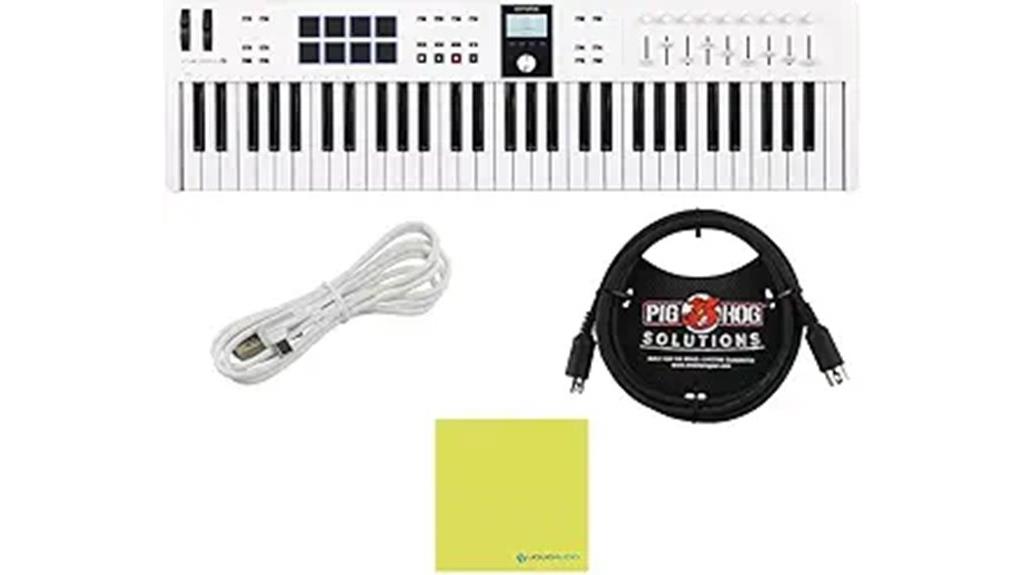
Portability meets professional performance in the Arturia KeyLab 61 Essential mk3, which weighs just 8.08 pounds while delivering a premium keybed experience that rivals much heavier controllers. You’ll appreciate the seamless integration with Analog Lab Intro, providing over 3000 presets that’ll keep your creative sessions flowing without hunting through endless sound banks. The included sustain pedal, while receiving mixed reviews for its feel, gets the job done for most bedroom producers and live performers who aren’t breaking it down nightly. With stellar DAW compatibility, particularly in Ableton and Reaper, this controller earns its 4.6-star rating through reliable performance rather than flashy features.
Best For: Bedroom producers and mobile musicians who need a lightweight, professional-quality MIDI controller with extensive preset libraries and reliable DAW integration.
Pros:
- Exceptional portability at just 8.08 pounds while maintaining premium keybed quality
- Seamless integration with major DAWs like Ableton and Reaper, plus over 3000 presets included
- Strong 4.6-star customer rating with consistent praise for build quality and reliability
Cons:
- Sustain pedal receives mixed reviews for feel and usability
- Limited software package compared to higher-end controllers
- May not withstand heavy nightly use for professional touring musicians
Arturia KeyLab Essential mk3 61 Key USB MIDI Keyboard Controller
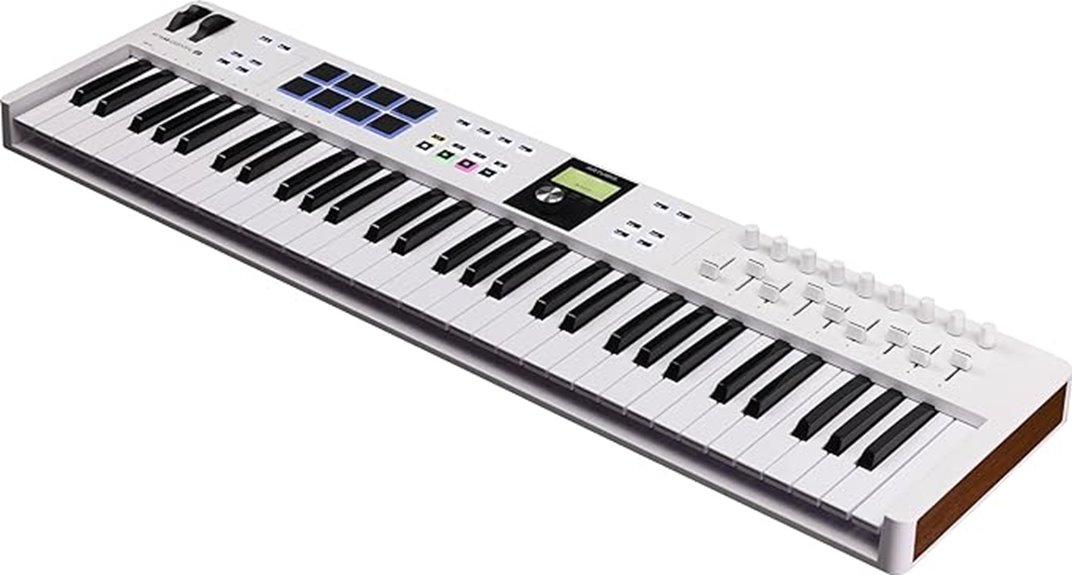
Since creative workflow enhancement drives modern music production, I’ve found the Arturia KeyLab Essential mk3 61 stands out as an exceptional choice for producers and composers who demand intuitive control alongside extensive software integration. The 8 RGB-backlit velocity-sensitive pads complement the 9 assignable faders and rotary knobs perfectly, while the 2.5″ LCD screen provides clear visual feedback during sessions. Scale Mode, Chord Mode, and the built-in arpeggiator simplify complex composition tasks, though I’ll admit the learning curve initially challenged my muscle memory. Custom DAW integration supports Ableton Live, Logic Pro X, FL Studio seamlessly, making setup surprisingly straightforward. The thorough software package, including Analog Lab V with 2000 presets, delivers exceptional value for under £200.
Best For: Music producers and composers who want an intuitive MIDI controller with extensive DAW integration and comprehensive software package for creative workflow enhancement.
Pros:
- Exceptional value with comprehensive software package including Analog Lab V, 2000 presets, and multiple subscriptions for under £200
- Seamless DAW integration with major platforms like Ableton Live, Logic Pro X, and FL Studio makes setup straightforward
- Creative features like Scale Mode, Chord Mode, and built-in arpeggiator simplify complex composition tasks
Cons:
- Initial learning curve can challenge muscle memory when adapting to the new interface
- Limited to USB connectivity only with no additional connection options
- Weighs 6.78 pounds which may impact portability for mobile producers
Nektar Impact GX61 USB MIDI Controller Keyboard

The Nektar Impact GX61 strikes an impressive balance between affordability and functionality, making it an ideal choice for budget-conscious producers, beginners, and hobbyists who need reliable DAW integration without breaking the bank. You’ll find 61 velocity-sensitive synth-action keys that deliver responsive performance with zero latency, while 14 assignable MIDI buttons and dedicated transport controls give you extensive DAW command without touching your computer. The included Bitwig 8-Track software sweetens the deal considerably, and Nektar’s integration works seamlessly across 11 popular DAWs including Reaper and Ableton. Though the plastic construction keeps costs down, you’re getting surprisingly solid build quality that withstands regular use admirably.
Best For: Budget-conscious producers, beginners, and hobbyists who need reliable DAW integration and responsive MIDI control without spending a fortune.
Pros:
- 61 velocity-sensitive synth-action keys with zero latency and seamless DAW integration across 11 popular software platforms
- Extensive control options including 14 assignable MIDI buttons, transport controls, and pitch/modulation wheels for comprehensive DAW command
- Excellent value package with included Bitwig 8-Track software and surprisingly solid build quality despite plastic construction
Cons:
- Plastic construction may feel less premium compared to higher-end controllers with metal components
- Some users report inconsistency in key stiffness and overly stiff volume/modulation wheels
- Limited to 61 keys which may restrict players who need a full 88-key range for more complex compositions
Nektar SE61 USB MIDI Controller Keyboard with DAW Integration

Music producers who need seamless DAW integration without breaking the bank will find the Nektar SE61 particularly appealing, as it bridges the gap between basic MIDI controllers and expensive studio-grade equipment with its thorough software compatibility. This 61-key controller works with virtually every popular DAW, including Bitwig, Cubase, Logic, and Reason, while maintaining plug-and-play functionality across Mac, PC, and iOS devices. Though some users mention the build quality feels somewhat budget-oriented, the velocity-sensitive keys deliver solid playability for the price point. You’ll appreciate the included Bigwig Studio software package, which adds immediate value for beginners entering music production.
Best For: Music producers and beginners seeking an affordable MIDI controller with comprehensive DAW compatibility and plug-and-play functionality across multiple devices.
Pros:
- Works seamlessly with virtually all popular DAWs including Bitwig, Cubase, Logic, and Reason across Mac, PC, and iOS devices
- Includes Bigwig Studio 8-track DAW software and sound content package for immediate music production capability
- Plug-and-play USB functionality with velocity-sensitive keys and essential performance controls at an affordable price point
Cons:
- Build quality feels somewhat cheap and budget-oriented according to user feedback
- Only offers USB connectivity with no 5-pin MIDI connection option
- Limited to basic functionality without advanced performance features found in higher-end controllers
M-Audio Keystation 61 MK3 USB MIDI Keyboard Controller

Budget-conscious producers and aspiring musicians will find exceptional value in the M-Audio Keystation 61 MK3, which delivers professional-grade functionality without the premium price tag that often accompanies feature-rich MIDI controllers. You’ll appreciate the 61 full-size velocity-sensitive semi-weighted keys that capture subtle performance nuances, while the ergonomically-designed pitch and modulation wheels provide smooth, responsive control during recording sessions. The plug-and-play connectivity eliminates driver headaches on Mac or PC, and you can even connect to iOS devices with Apple’s camera adapter. The included premium software suite featuring MPC Beats, Ableton Live Lite, and additional plugins fundamentally provides everything needed to start producing immediately.
Best For: Budget-conscious producers, aspiring musicians, and beginners who want professional-grade MIDI controller functionality with responsive keys and comprehensive software without paying premium prices.
Pros:
- 61 full-size velocity-sensitive semi-weighted keys provide natural feel and capture performance nuances for expressive playing
- Plug-and-play connectivity works seamlessly with Mac, PC, and iOS devices without requiring driver installation
- Comprehensive premium software bundle includes MPC Beats, Ableton Live Lite, and multiple plugins for immediate music production
Cons:
- Semi-weighted keys may not satisfy pianists accustomed to fully-weighted hammer action keyboards
- iOS connectivity requires purchasing Apple’s camera adapter separately, adding to the overall cost
- Compact design may limit the number of physical controls compared to larger, more expensive MIDI controllers
Novation Launchkey 61 MK4 MIDI Keyboard Controller with DAW Integration
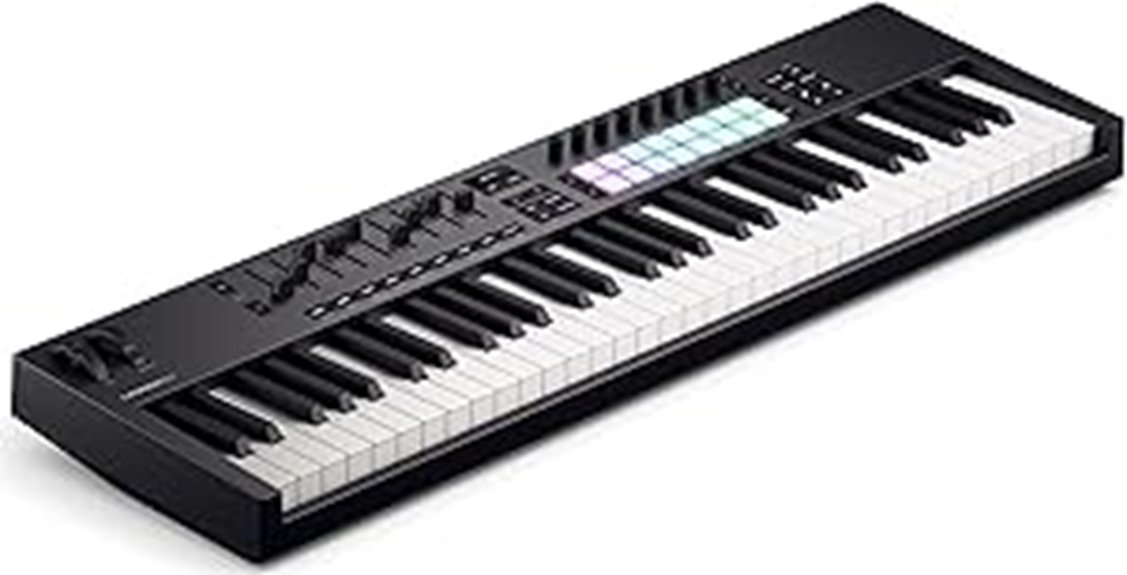
For producers who need seamless DAW integration without sacrificing creative workflow, the Novation Launchkey 61 MK4 stands out with its extensive software compatibility across seven major digital audio workstations, including Ableton Live, Logic, and FL Studio. What sets this controller apart from basic keyboards is its intelligent FSR drum pads, which function as step sequencers, clip launchers, and chord triggers depending on your current workflow needs. The built-in Scale Mode fundamentally prevents wrong notes by filtering your input to selected scales, while the arpeggiator creates evolving patterns that’ll inspire new musical directions you hadn’t considered before exploring its creative potential.
Best For: Music producers who work across multiple DAWs and want a versatile controller that combines intelligent creative features like scale modes and versatile FSR pads with comprehensive software integration.
Pros:
- Seamless integration with seven major DAWs plus NKS compatibility for streamlined workflow across different software platforms
- Intelligent FSR pads that adapt to multiple functions (step sequencing, clip launching, chord triggering) for enhanced creative flexibility
- Built-in Scale Mode and arpeggiator features that help prevent musical mistakes while inspiring new creative directions
Cons:
- Semi-weighted keys may not satisfy users who prefer fully weighted piano-style action for realistic playing feel
- 61-key layout limits range compared to 88-key controllers for full piano compositions and classical music production
- Feature-rich interface may present a learning curve for beginners who just need basic MIDI keyboard functionality
M-AUDIO Oxygen Pro 61 Key USB MIDI Keyboard Controller
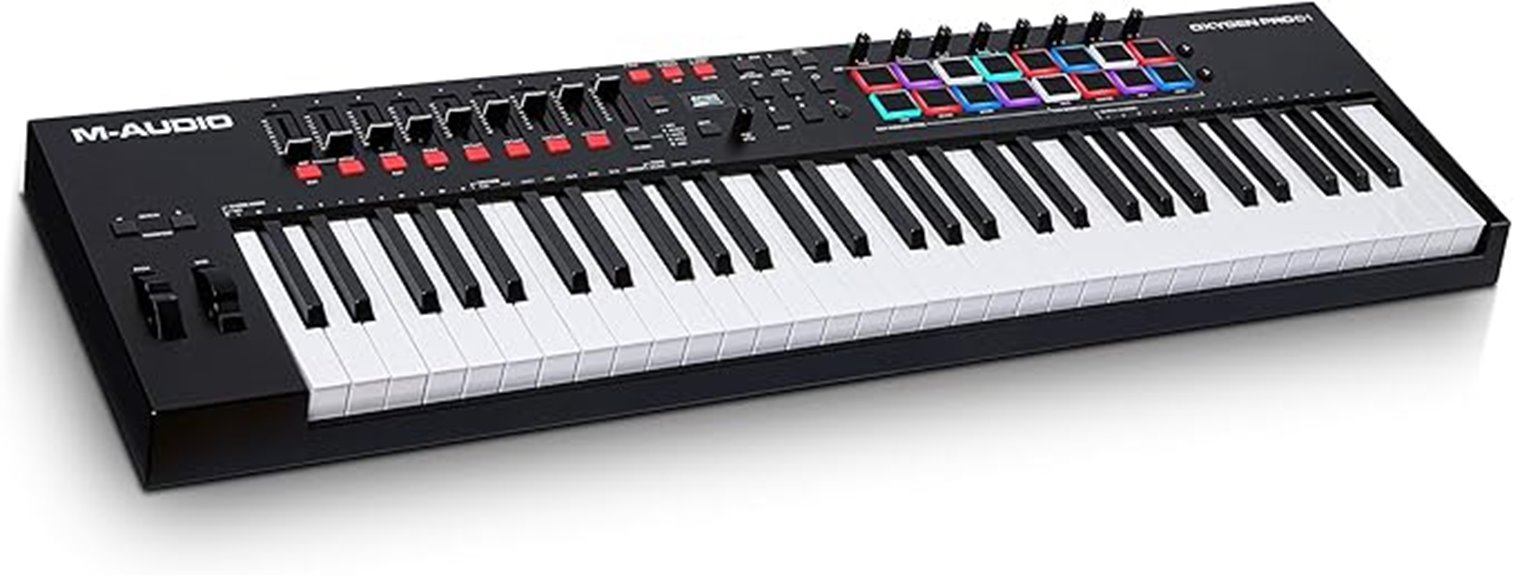
The M-Audio Oxygen Pro 61 stands out as the ideal choice for producers and composers who demand extensive control without breaking the bank, offering a remarkable blend of 61 velocity-sensitive, semi-weighted keys with aftertouch alongside an impressive array of hands-on controls. You’ll appreciate the 16 RGB backlit drum pads with Note Repeat functionality, eight assignable knobs, nine faders, and Smart Chord modes that streamline your creative workflow. I’ve found the Native Kontrol Standard integration particularly valuable, as it provides seamless auto-mapping for DAW controls and plugin parameters without tedious manual configuration. The included software package featuring MPC Beats and Ableton Live Lite adds considerable value to an already competitive offering.
Best For: Producers and composers who need extensive MIDI control capabilities with semi-weighted keys, comprehensive hands-on controls, and seamless DAW integration at an affordable price point.
Pros:
- Comprehensive control suite with 61 semi-weighted keys, 16 RGB drum pads, 8 knobs, 9 faders, and Smart Chord/Scale modes for complete creative workflow management
- Native Kontrol Standard integration provides effortless auto-mapping for DAW controls and plugin parameters without manual configuration
- Excellent value with included software package featuring MPC Beats, Ableton Live Lite, and virtual instruments from AIR Music Tech
Cons:
- Semi-weighted keys may not satisfy users who prefer fully weighted piano-style action for realistic playing feel
- 61-key layout limits range compared to 88-key controllers for composers who need full piano range
- Dependency on software downloads via card may cause delays in getting started if internet connection or website access issues occur
Factors to Consider When Choosing 61 Key Midi Controllers
When I’m evaluating 61-key MIDI controllers, I focus on five critical factors that’ll determine whether you’re making a smart investment or setting yourself up for buyer’s remorse. The key action and feel directly impacts your playing experience, while DAW integration capabilities, control surface features, and included software bundles can either streamline your workflow or leave you scrambling for third-party solutions. I’ve learned through years of testing that build quality and durability often separate the controllers that’ll serve you reliably for decades from those that’ll have you shopping for replacements within two years.
Key Action and Feel
Although I’ve tested dozens of MIDI controllers over the years, I can confidently say that key action remains the single most critical factor separating exceptional instruments from mediocre ones. Fully weighted keys provide that authentic piano feel I crave for classical pieces, while synth-action keys offer lightning-fast response that’s perfect for electronic music production. Semi-weighted keys strike that sweet spot between both worlds, giving me enough resistance for piano sounds without sacrificing speed for synthesizer work. Velocity-sensitive keys are absolutely essential—they capture every subtle dynamic from whisper-soft touches to powerful fortissimos. When I find controllers with aftertouch capabilities, the expressive possibilities multiply dramatically, allowing me to add vibrato and filter sweeps simply by varying finger pressure after striking keys.
DAW Integration Capabilities
After testing countless MIDI controllers in my studio setup, I’ve learned that seamless DAW integration can make or break your creative workflow, transforming a potentially frustrating experience into an effortlessly intuitive one. I prioritize controllers with custom scripts that automatically configure dedicated buttons and faders for Ableton Live, Logic Pro, and FL Studio, eliminating tedious manual mapping sessions that used to drain my creative energy. Plug-and-play functionality remains essential, allowing immediate connection without driver installations or complex setup procedures that interrupt inspiration. Real-time feedback through LCD screens and RGB pads provides vital parameter information during recording sessions, while smart chord and scale modes prevent those embarrassing wrong notes that haunted my early performances, streamlining composition with intelligent harmonic assistance.
Control Surface Features
The physical control surface transforms your MIDI controller from a simple keyboard into a thorough command center, and I’ve discovered that the quality and layout of these tactile elements directly impacts how efficiently you’ll navigate your digital workspace. Assignable knobs, faders, and buttons provide essential control over your DAW parameters, virtual instrument settings, and mix levels without constantly reaching for your mouse. I particularly value RGB backlit pads because they offer immediate visual feedback during live performances, making it easier to identify active samples or drum sounds in dimly lit venues. Integrated arpeggiators and scale modes streamline the creative process, helping you generate musical ideas quickly while maintaining proper harmonic structure, which I find invaluable during spontaneous songwriting sessions.
Software Bundle Inclusions
Most MIDI controller manufacturers understand that hardware alone doesn’t create music, which explains why they’ve started including extensive software bundles that can instantly transform your new 61-key controller into a complete production studio. I’ve found that controllers like the Arturia KeyLab series excel here, offering thousands of preset sounds and thorough virtual instrument libraries that eliminate the need for immediate additional purchases. What impresses me most are the immersive learning experiences some manufacturers provide, including tutorials and lessons that accelerate your workflow familiarity. However, I always recommend verifying DAW compatibility before committing, since some bundles integrate seamlessly with specific platforms while others might leave you scrambling for workarounds that disrupt your creative process.
Build Quality and Durability
While shopping for controllers has taught me some expensive lessons about cutting corners, I’ve learned that build quality determines whether your 61-key MIDI controller becomes a reliable creative partner or an expensive paperweight within a year of purchase. I’ve discovered that weight often indicates construction quality, with heavier models featuring metal components and reinforced keybeds that survive countless studio sessions and live performances. Premium keybeds don’t just feel better under your fingers; they’re engineered for longevity, maintaining consistent response after thousands of key presses. I always check user reviews for reports about button failures, sticky keys, or dead zones, since these reveal weak points manufacturers won’t advertise. Controllers with protective features against dust and moisture prove their worth when you’re dealing with real-world environments.
Connectivity and Port Options
Connections determine whether your 61-key MIDI controller integrates seamlessly into your setup or becomes a frustrating bottleneck that limits your creative workflow. I always prioritize USB connectivity first, since it offers true plug-and-play functionality with computers and mobile devices without requiring additional drivers. Traditional MIDI 5-pin outputs remain essential for connecting to older synthesizers and legacy equipment, providing compatibility that USB alone can’t match. USB-C ports are becoming increasingly valuable, delivering faster data transfer rates and simplified connections with modern devices. I strongly recommend checking for foot pedal inputs, particularly sustain pedal compatibility, which dramatically enhances expressive performance capabilities. Controllers that accept WAV file imports or external audio connections add significant versatility to sample playback and integration possibilities.
Creative Performance Tools
Beyond basic note triggering, creative performance tools transform a 61-key MIDI controller from a simple input device into an expressive instrument that can inspire entirely new musical directions. I’ve found that Scale Mode and Chord Mode features revolutionize compositional workflow, allowing musicians to play confidently within specific scales or trigger complex chord progressions with single keypresses. An integrated arpeggiator becomes invaluable for generating rhythmic patterns automatically, while velocity-sensitive pads and keys provide the expressive control I need to dynamically shape sound texture and intensity during performances. The real magic happens with adjustable parameters like assignable knobs and faders, which offer hands-on control over software instruments and effects, creating immersive performance experiences that seamlessly integrate with extensive DAW workflow.
Price and Value Proposition
Three distinct price tiers define the 61-key MIDI controller market, each offering compelling value propositions that align with different user needs and budgets. I’ve found entry-level models around $150 provide essential functionality with basic software bundles, while mid-tier controllers between $300-500 deliver enhanced build quality, advanced DAW integration, and extensive virtual instrument packages. Premium options exceeding $700 justify their cost through professional-grade construction, extensive performance features, and software collections worth thousands of dollars. When calculating total ownership costs, I always factor in potential expenses like sustain pedals, stands, and future software upgrades. The consistently high customer satisfaction ratings above 4.5 stars across price ranges suggest manufacturers understand their target markets well, delivering genuine value that matches user expectations.
On a final note
After testing countless 61-key controllers, I’ve found these models offer the best balance of features, build quality, and value for your studio. Whether you’re tracking ideas with the budget-friendly Keystation 61 MK3 or performing live with the feature-packed Novation 61SL MkIII, there’s something here for every workflow. Consider your specific needs, budget constraints, and preferred software integration when making your final decision—you honestly can’t go wrong with any of these recommendations.

